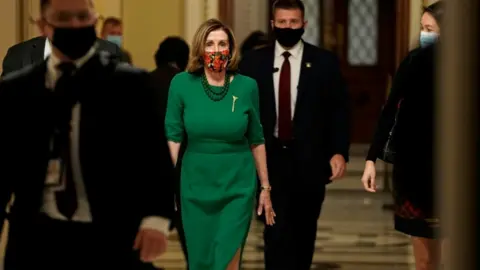Covid: US parties wrangle in Congress after Trump shuns stimulus bill
 Reuters
ReutersDemocrats and Republicans have blocked each other's attempts to amend a vital $900bn (£665bn) stimulus package after President Donald Trump sent it back to Congress demanding changes.
The coronavirus economic relief, which comes with a $1.4tn federal budget attached, was agreed by both sides.
But Mr Trump said one-off payments to Americans should increase from $600 to $2,000, and foreign aid should be cut.
Without the bill in force, many Americans face an uncertain Christmas.
Unemployment benefits are due to expire on Saturday if the bill is not enacted, and a moratorium on evictions may not be extended.
Legislators could pass a stopgap bill by Monday to prevent a partial government shutdown looming a day later, but this would not include coronavirus aid and Mr Trump would still have to sign it.
Meeting on Thursday in response to Mr Trump's intervention, Democrats in the House of Representatives blocked Republican attempts to cut foreign aid from the federal spending bill, while Republicans refused to allow the increase in coronavirus payments to $2,000.
House Republican leader Kevin McCarthy said in a letter to colleagues: "House Democrats appear to be suffering from selective hearing."
While the haggling continues on Capitol Hill, the president is spending Christmas at his resort in Palm Beach, Florida. A White House memo said he was working "tirelessly" with "many meetings and calls", though he was spotted at his golf course on Thursday morning.
House Speaker Nancy Pelosi, a Democrat, said the lower chamber would meet again next Monday to vote on the stimulus payments for Americans.
On the same day, the House is also expected to vote on an unrelated, $740bn defence spending bill, which Mr Trump vetoed on Wednesday instead of signing into law. Lawmakers plan to override the president's veto and enact the legislation anyway, but to do so they need two-thirds of votes in both the House and Senate.
Mr Trump is objecting to provisions in the defence bill that limit troop withdrawals from Afghanistan and Europe and remove Confederate leaders' names from military bases.
The $900bn coronavirus aid relief bill - with the larger budget bill rolled in - overwhelmingly passed the House of Representatives and Senate on Monday but a day later Mr Trump issued an implied veto threat, describing the package in a video statement as a "disgrace" full of "wasteful" items.
He baulked at the annual aid money for other countries in the federal budget, arguing that those funds should instead go to struggling Americans.
Mr Trump's decision to bat the measure back to Capitol Hill stunned lawmakers since he has largely stayed out of negotiations for a coronavirus aid bill that had stalled since last July.
His top economic adviser, Treasury Secretary Steven Mnuchin, had proposed the $600 payments early this month, and many have questioned why the president waited until now to object.
The one-off payments of $600 and the federal jobless benefits are half the sum provided by the last major coronavirus aid bill in March, which contained $2.4tn in economic relief.
Mr Trump's call for more generous one-off payments to Americans has found him in rare agreement with some liberal Democrats who are usually his sworn political foes.
Congresswoman Alexandria Ocasio-Cortez tweeted: "Glad to see the President is willing to support our legislation."
But many of the president's fellow Republicans are said to be dismayed that Democrats will now depict them as Scrooges for rejecting higher spending.
On a conference call Wednesday, House Republicans said Mr Trump had thrown them under a bus, according to the Associated Press news agency.
Many of them now face the dilemma of choosing between the president and party.
Though conservatives are protesting over the spiralling trillion-dollar US deficit, they and the president enacted tax cuts in 2017 that added to America's overdraft.
The congressional gridlock comes amid runoff votes in Georgia for two Senate seats that will determine the balance of power in Washington next year.
Republican Senators David Perdue and Kelly Loeffler are fighting for their political lives in the 5 January special election. Both had backed the aid bill spurned by Mr Trump.
If Democrats Jon Ossoff and Raphael Warnock can flip these two seats, their party will control all of Congress and the White House once President-elect Joe Biden takes office later next month.
